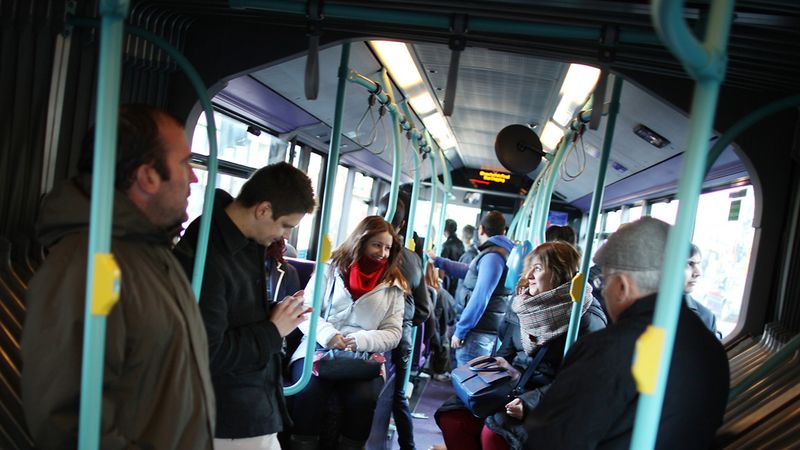Time to debunk a myth that’s been turning up more and more when we talk about relationships: the idea that two people of the opposite gender can be “just passengers on the same bus.” That a man and a woman can share a bus ride for multiple stops and, so the story goes, still harbor no feelings for each other beyond those of two people platonically aboard the same mass transit vehicle.
Sure, it sounds fine in theory. In practice, though, two people of different genders on the same bus is dicey territory.
As anyone who’s been in one of these situations knows, awkward tension with co-passengers of the opposite sex is unavoidable. Even if neither person said anything when he or she got on, the subtext was there, and biology will kick in soon enough. Put a man and a woman on a bus for long enough and sparks are bound to fly.
You might think it makes sense to say, “This person and I have been on this bus together for five stops. We’re both attractive people, but we relate to each other purely as passengers. It doesn’t go any further than that.” Trouble is, it inevitably does go further than that, whether you want to admit it or not. Even if one of you views your interaction as limited to standing a few feet apart from the other without making eye contact, chances are the other one sees it as something more intimate than that.
Put a man and a woman on a bus for long enough and sparks are bound to fly.
Unfortunately, there’s no clean line to draw between being passengers on the same bus and being in a romantic relationship. For example, what does it mean if two people are sitting in seats that are facing each other, but aren’t directly across from each other? What if a woman asks a man whether the bus has already passed a certain stop? How about the sexual ambiguity of two people holding onto different parts of the same suspended handrail?
Since satisfying answers to these questions are impossible, the best course of action is clear communication. If you’re not interested in a fellow bus passenger, tell him or her so directly, as soon as you get on the bus. Approach him or her. Say, “Listen, I’m on this bus with you, but I don’t see this as a sex thing, or even as an acquaintanceship. It’s nothing against you. I think you’re awesome, and I really hope my saying this doesn’t cause you to get off this bus any sooner than you intended to.” This way, you reduce the risk of leading your fellow passengers on and hurting their feelings.
Of course, none of this is to say you should dismiss pursuing a passenger-passenger relationship out of hand—sometimes they can blossom into a mutually satisfying friendship, or even love. As a full disclosure: My wife and I met on a bus in Salt Lake City when we were both in grad school, and remained married for nearly 15 years prior to an acrimonious, very painful divorce in 2011.





